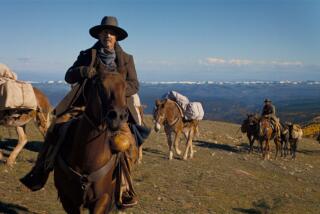BOOK REVIEW : A Story Set Adrift From Loose Moorings : UNDER THE GYPSY MOON <i> by Lawrence Thornton</i> Doubleday $18.95, 210 pages
- Share via
Imagination is a blind leap over a frontier ditch. You can find yourself in an astonishingly different country, or at the bottom of the ditch.
Lawrence Thornton’s novel, “Imagining Argentina,” was a leap of the fortunate kind. A California professor and writer, he did precisely what his title suggested.
From the single image of the Argentine desaparecidos --victims of the peculiar military terror that consisted of official abduction and official denial of the existence of the abducted--he created a fictional and utterly real realm of political psychosis, remarkably resembling its model. There were minor errors of detail in his Buenos Aires, but he caught its essence by imagining it.
In “Under the Gypsy Moon,” Thornton’s leap flails and lands us in the ditch. Perhaps it is because in this novel about a writer caught up in the Spanish Civil War and then in the French Resistance, his point of imagination is fuzzier.
Instead of a literary transformation worked directly upon a real situation, the transformation here is at one remove. It centers upon the Falangists’ murder of the poet Federico Garcia Lorca. This, of course, was real, and Thornton uses a number of biographical details. The heart of the book, though, is an awkward orchestration of Garcia Lorca’s own literary persona. The author does a lush and swollen transcription of the Spaniard’s steel-stringed plangency, and some of the notes are wrong.
“Gypsy Moon” tells of a writer, Joaquin Wolf, son of a German father and a Spanish mother. Exhausted after two brilliantly successful novels, he leaves his home in Paris to attend a writers’ congress in Madrid in 1936, just as the Civil War is about to break out. There he meets Garcia Lorca, then on the point of returning to his home in Granada. A few days later, Joaquin gets word that the poet has been shot by a Falangist gang.
Joaquin goes to Granada, visits the death site, and joins the Republican forces. Puzzlingly, Thornton refers to them as “rebels,” though it was Franco’s troops who were the rebels. It is one of a number of errors and loose moorings.
Joaquin finds himself in Guernica when the Germans bomb it. Wounded, he returns to Paris. When the Germans invade France, he joins an underground newspaper and writes a series of “Letters to Lorca,” using the memory of the poet to kindle a spirit of resistance.
He moves in with Ursula, a German woman who had lived many years in France after working in a Berlin brothel after World War I to support herself and her daughter. After narrowly escaping arrest by the Gestapo, they all take a train to Lisbon where, thanks to a visa given to the daughter’s French husband, they emigrate to the United States. On the way, they are stopped at the Spanish border. Trying to get across the frontier on foot, Joaquin is killed by a Guardia Civil patrol. The story is told by Ursula, aboard the ship that is taking her and her daughter and son-in-law from Lisbon to America.
Ursula speaks with insistent melodrama. She decides her story and Joaquin’s is to be melded with Garcia Lorca’s life and voice. On the ship, she thinks of the lovers in Lorca’s “Romance Sonambulo” and proceeds to reflect:
“And so I thought, Since it’s there, why not use it? Memory needs jogging into place. Otherwise it’s only jumbled images and phrases seem like newspaper headlines out of the corner of the eye. So I will shape this against the background of that poem, looking at the sea the way the Gypsy looked over her balcony to the green pool below while she waited for her lover to return. I am well ahead of her in knowledge, seasoned with experiences that would have been quite beyond her, being the traditional Spanish woman that she was. Unlike her, I suffer no false hope, yet we are connected, this unnamed character in a poem and Ursula Krieger. Nowhere are we closer than when we contemplate the water and think of our men, hers a smuggler, mine a writer of some renown.”
That kind of writing, which we come upon repeatedly through the book, makes it hard to care about Ursula and Joaquin or Garcia Lorca either, for that matter.
Next: Elaine Kendall reviews “Sexual Intercourse” by Rose Boyt (Random House).
More to Read
Sign up for our Book Club newsletter
Get the latest news, events and more from the Los Angeles Times Book Club, and help us get L.A. reading and talking.
You may occasionally receive promotional content from the Los Angeles Times.







